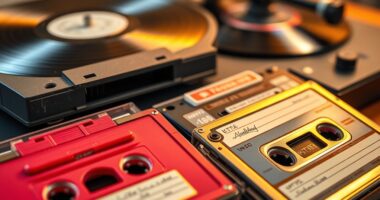Cassette tapes are making a comeback because they offer a unique, authentic feel that digital music can’t provide. They let you experience music more intentionally, with limited editions and physical details that create a deeper connection. Tapes also foster a creative DIY scene, giving artists and fans a sense of community and control. If you want to discover how this nostalgia-driven movement is shaping modern culture, there’s more to explore ahead.
Key Takeaways
- The DIY spirit of cassette culture empowers independent artists to produce and distribute music outside mainstream channels.
- Collectors value tapes for their tangible, nostalgic qualities and rarity, fostering vibrant underground communities.
- Tapes offer a slower, more authentic listening experience that enhances personal connection with music.
- Limited runs and physicality support creative independence and strengthen artist-fan relationships.
- The resurgence signifies a rebellion against disposable digital media, emphasizing authenticity, community, and cultural values.

Have you ever wondered how a simple tape deck revolutionized independent music? The answer lies in the DIY spirit that the cassette format fostered. Back in the day, anyone with a tape deck and some creativity could produce their own music or mix tapes, bypassing big record labels and mainstream channels. This DIY production approach gave rise to a vibrant underground scene where artists could experiment freely and share their work without gatekeepers. It wasn’t just about making music; it was about taking control of the entire process—from recording to distribution. This sense of independence remains at the core of cassette culture today, inspiring a new generation eager to craft their sound and express themselves outside the digital mainstream.
Many of these enthusiasts are part of collector communities, groups that obsessively hunt for rare tapes, limited editions, and obscure releases. These communities thrive on the thrill of discovery and the nostalgia associated with physical media. Unlike digital files, tapes possess a tangible, collectible quality that makes them special. You can hold them in your hands, admire their artwork, and appreciate the unique imperfections that come with analog recording. For collectors, each tape is a piece of history, a snapshot of a particular moment in music or underground culture. These communities often exchange tapes through swaps, trades, or small independent shops, creating a shared sense of belonging rooted in a common love for the format.
The resurgence of cassette tapes also taps into a desire for authenticity in music. In a world dominated by streaming and instant access, tapes offer a slower, more deliberate listening experience. You’re more likely to listen to an entire album when you press play on a tape than when clicking through endless playlists. This intentionality makes listening more personal and meaningful. Furthermore, DIY production plays a big role in this revival. Artists are now recording and releasing their work on tapes, often in limited runs, which adds an element of exclusivity and uniqueness. It’s a way to connect directly with fans, to share something tangible and special in an age of digital abundance.
Additionally, the collectible aspect of tapes fuels ongoing interest among fans and artists alike. In essence, cassette culture isn’t just about nostalgia; it’s a rebellion against the fleeting, disposable nature of digital media. It’s about reclaiming a space where creativity, authenticity, and community flourish. Whether you’re a collector hunting for rare tapes or an artist making music on your own terms, the cassette format continues to inspire a movement that values the physical, the personal, and the DIY ethos. This resurgence isn’t just a trend—it’s a testament to how a simple technology can reshape cultural values and keep the spirit of independent music alive.
Frequently Asked Questions
How Do Cassette Tapes Compare to Digital Music Quality?
You’ll notice that cassette tapes offer a distinct analog warmth that digital music often lacks, giving your listening experience a cozy, nostalgic feel. However, when considering audio fidelity, digital formats typically provide clearer, crisper sound with less noise and distortion. While tapes may have a charming, imperfect quality, digital music delivers consistent quality and convenience, making it easier to enjoy high-fidelity sound anytime.
What Are the Best Methods for Preserving Cassette Tapes Long-Term?
Your cassette tapes are treasures worth saving, so you should store them in an archival storage environment to prevent deterioration. Keep tapes away from heat, humidity, and magnetic fields, and consider using tape restoration techniques when needed to fix degraded recordings. Regularly rewind and play your tapes to keep the tape moving smoothly. Proper preservation guarantees your collection stays vibrant and accessible for decades, making your music legacy unstoppable.
Are There Any New Technologies Enhancing Cassette Tape Listening?
Yes, new technologies improve your cassette listening experience by enhancing tape fidelity and preserving that analog warmth you love. Modern digital converters and high-quality tape decks reduce background noise and distortions, making your tapes sound clearer. Additionally, advanced playback equipment with better heads and circuitry captures the authentic analog warmth, allowing you to enjoy the nostalgic sound quality while benefiting from improved durability and playback accuracy.
How Do Cassette Tapes Influence Modern Music Production?
You’re riding the wave of nostalgia, and cassette tapes influence modern music production by adding that one-of-a-kind analog warmth that digital just can’t replicate. Artists intentionally incorporate cassette sounds to evoke a vintage vibe, making recordings feel more authentic and personal. This nostalgic appeal pushes producers to blend old-school charm with new technology, creating a fresh yet familiar soundscape. It’s like bringing a piece of the past into today’s creative process.
Can I Create Custom Cassette Tapes at Home?
Yes, you can create custom cassette tapes at home. Start with DIY recording using your own music or mixes, then use a cassette duplicator or a tape recorder with editing capabilities. Add your personal touch with custom artwork for the cassette case and label. This process lets you produce unique, handcrafted tapes that reflect your style and creativity, perfect for sharing or collecting.
Conclusion
So, next time you proudly display your vintage cassette collection, remember—you’re not just embracing nostalgia, you’re risking a lifetime of tangled tapes and endless rewinding. Sure, tapes might be “back,” but so is your old Walkman’s dead battery. Who needs convenience when you can spend hours trying to find that elusive track? Embrace the chaos—you’re officially a part of the “cool” crowd, even if your playlist is forever lost in a tape’s mysterious abyss.









